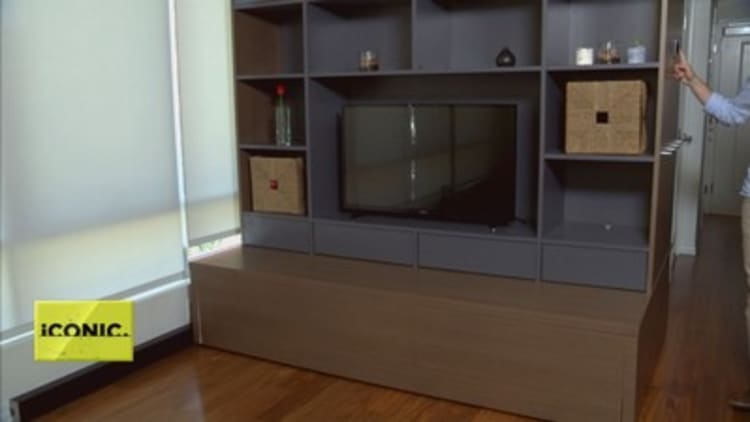
Ask any apartment dweller in a crowded city and they'll likely tell you space is among their biggest issues. Those living in even smaller studios know the battle all too well — some even shelling out monthly cash for storage units as a result just to make more room to live.
Boston-based start-up Ori is out to solve those problems with a system that combines robotics and apartment-friendly modular furniture to transform small spaces in seconds. Think of it as a kind of retractable Murphy bed on steroids.
The company's namesake Ori system is named for the Japanese word "origami," the art of folding paper, and literally does just that. The technology uses modular furniture and software that makes your furniture reconfigurable, transforming small spaces from living rooms into bedrooms and even workspaces with the push of a button. The system is designed for spaces between 300 and 500 square feet.
"We wanted to make spaces in homes, offices and hotels much more functional and efficient but also more intelligent by bringing robotics into play," said founder and CEO Hasier Larrea. "When you have so many people moving into the same place, you need to start being more efficient about how you use the spaces."
Ori spun-off from Massachusetts Institute of Technology's Media Lab, which helps to accelerate start-ups and ideas focused on technologies for people to "create a better future." Larrea, who led the lab's architectural robotics research area under MIT faculty member Kent Larson, was inspired by the idea of merging robotics and furniture and having spaces adapt to the needs of people, instead of residents simply making due with the space they have in their apartments.
More from iCONIC:
11 tech gadgets that were the next big thing — before failing miserably
Concierge sells to the highest bidder
7 cool start-ups that have snared millions
The system is now in beta testing and is a business-to-business product. Ori is working with luxury developers Boston Properties, Skanska and Samuels Associates to install the furniture in high-end rentals in Boston. The start-up is working with designer Yves Béhar on the furniture designs.
The Boston models are being rented on Airbnb so Ori can comb over customer feedback and improve the system in the future. The system will expand into properties in Washington, D.C., and Seattle in the near future, with a hard launch in 2017, Larrea said. The start-up has raised an undisclosed seed round and is now actively fundraising again to raise money for its national launch.



All of Ori's product is manufactured in the United States, and Larrea said the furniture is actually more expensive to make than the robotics. Assembly is also simple — the unit can be put together in just a day, Larrea explained. The biggest challenge for this MIT team was making the system feel and look personal.
"We are robotics people and have created these amazing robots with amazing capabilities," he said. "But when you bring a system into a home, it can't look like a robot."
Pricing is not yet available, but the system is sold to real estate developers instead of consumers, Larrea said. Tenants, who might normally pay a monthly storage-unit fee, will be instead charged per month for having the Ori system in their apartments. The technology is also ready to be integrated into an apartment's Internet of Things ecosystem, syncing with any existing smart home or office device, like the Amazon Echo system, for example.
"We are trying to show you that your home can almost become an app," Larrea said. "That is the idea — how to make spaces not only more functional but also intelligent. I call it furniture with superpowers."





